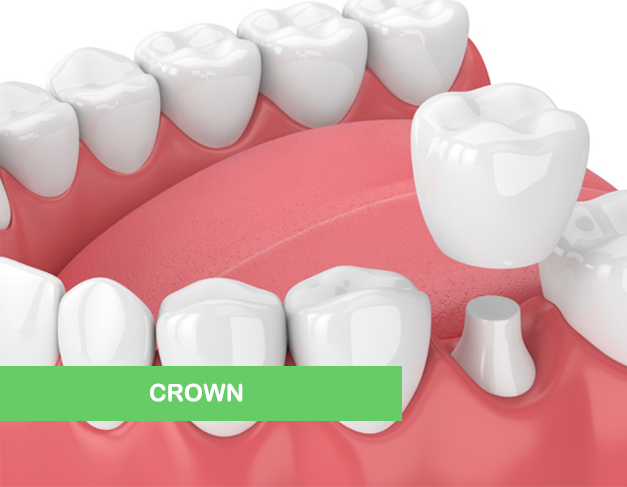Dental Crowns
 Made of gold or tooth-colored porcelain, a crown is often called a "cap". It is a restorative procedure for a tooth that is fractured or so badly decayed that its structure is compromised. A crown protects and strengthens the remaining tooth structure and restores it to its original shape and size.
Made of gold or tooth-colored porcelain, a crown is often called a "cap". It is a restorative procedure for a tooth that is fractured or so badly decayed that its structure is compromised. A crown protects and strengthens the remaining tooth structure and restores it to its original shape and size.
During your first appointment, decay will be removed and your tooth prepared for a crown. Then a highly accurate impression or "mold" is made of the prepared surface. This mold is used to create a model of the tooth. The model is then sent to a special dental laboratory that creates a crown in the material you choose: gold or tooth-colored porcelain fused to metal, both of which are lasting and durable. Another option is an all-porcelain crown, which is a great aesthetic choice. Made to perfectly match the shade and shape of your adjacent teeth, porcelain is strong and virtually undetectable. Its seamless look will keep your smile natural looking. However, not all teeth are candidates for all porcelain crowns. Dr. Jain will discuss your treatment options at your appointment.
While the mold for your crown is being produced, Dr. Jain will fit you with a temporary crown, made of durable plastic. You can expect to wear the temporary crown for two to three weeks.
Once the permanent crown is completed, you will come in for a second appointment. During this visit, the temporary crown is removed and the permanent crown is cemented onto the prepared surface of your tooth. Dr. Jain makes sure that the crown fits perfectly onto this area, reducing the size of the seam between the crown and the tooth. This helps keep decay from eventually occurring under the crown, and also extends the life of the crown.
When a crown is recommended, it's best to start the process before your tooth becomes severely decayed or fractured. An overly decayed tooth could lead to a root canal. A fractured tooth that's not crowned may have to be removed later on, which could involve a bridge or implant. By initiating the crown process promptly, you can prevent permanent loss of your tooth and even avoid the possibility of a more expensive procedure.


